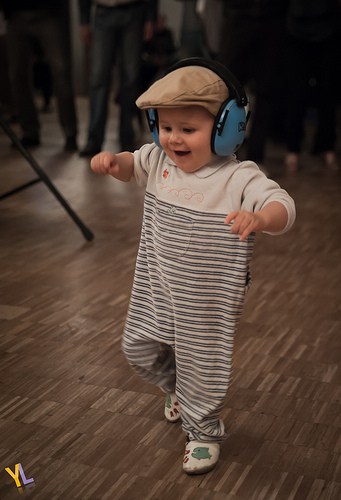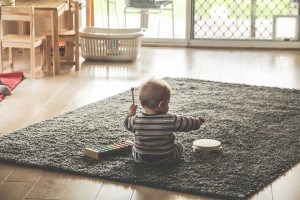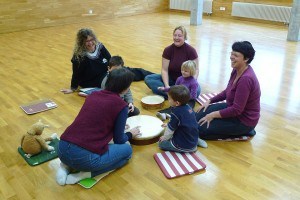
Whether it’s through intentional effort or not, music plays an important role in children’s lives, both formally and informally. Music is one of the few things that can stimulate the entire brain, impacting one’s cognition, motor skills, language, emotional health and social development.
Thanks to increased and widespread knowledge, most parents today appreciate these benefits. However, what most of them don’t realize is that music can have an even greater positive impact on their children if used properly.
One of the benefits of music that parents and children can enjoy is that it provides a way for them to bond.
Karen Stead, teacher with the Let’s Play Music program, said it is also an excellent way for parents to bond with their children, adding it is “highly important to me.”
However, it takes more than simply having music on in the background. Parents must be engaged and engage their children in the process.
“I started with my infants,” Stead said. “I would sing to them. I would imitate the sounds back to them that they made to me. They’re doing a lot of listening at a young age.” Via The Spectrum
A major challenge for most parents is the costly implications that come with making music a part of their children’s lives. There’s a lot of pressure to enroll even 3-year olds for private music lessons and purchasing musical instruments that come at a high cost.
However, the truth of the matter is that introducing music into your child’s life does not have to be expensive at all. Even the most informal approaches to music will have similar and sometimes even greater impact on your child.
A new study suggests that regular informal music-making with very young children may even have benefits above and beyond those of reading.
But there’s an important, interesting, and somewhat beautiful catch – for best results, make it shared music-making in your home.
In an analysis of data generated from a study involving more than 3,000 children, a University of Queensland team investigated the associations between informal home music education for very young children and later cognitive and social-emotional outcomes.
The team found that informal music-making in the home from around the ages of two and three can lead to better literacy, numeracy, social skills, and attention and emotion regulation by the age of five. Via The Conversation

Tara Dunn, director of the Kindermusik program for The Learning Center for Families, suggests that parents can make the experience more engaging by making simple instruments.
In fact, she encourages parents to make simple instruments themselves, rather than buying cheap toys at the store.
The key, she said, is to keep it simple.
“We don’t want Pinterest projects,” Dunn said.
Things like filling plastic bottles with rice or beans and then gluing the lid on, sanding dowels down to make rhythm sticks and turning plastic containers with plastic lids into drums. Via The Spectrum
With informal approaches, your creativity is the only limit to how much music you can bring into your child’s life. It may something as simple as introducing them to the songs you loved when you were a child or giving them a CD of their favorite songs as a gift.
Ready to bring more music home? Here are a few fun ways to add music to your everyday activities:
• Sing your bedtime stories: Belt out classic picture books, such as Five Little Ducks or Twinkle Twinkle Little Star.
• Make your own musical: When I’m talking to my kids, I often speak in song to make it more fun.
• Play a round of car karaoke: Find a song that everyone can sing along to (and they won’t notice the length of the car ride).
• Add a song to children’s routines: Create fun, silly songs to sing while brushing their teeth, cleaning up their toys and getting dressed for school.
• Try soothing spa music before bed: This will help children relax as they wind down.
• Tour a music store: Head down to your local shop and view the varied instruments.
• Mix it up in the kitchen: Grab a pot and wooden spoon to help them practice drumming a beat.
• Plan a musical outing: The Toronto Symphony Orchestra often hosts symphonies for kids, or visit an opera or family musical. Via The Globe and Mail
The list is endless!

Bear in mind that parental involvement is a critical element in the process of making music part of a child’s life. Even in formalized music education setting, parents that are more involved in their children’s practice sessions, for instance, realize greater returns on their investment.
Additionally, parental involvement makes for a much more pleasant experience for the kids. Rather than see their music practice sessions as a task, kids whose parents are involved in their music see it as something to enjoy and even look forward to.
Featured Image: Image Credit
A study finds that regular informal music-making with very young children may even have benefits above and beyond those of reading.
— Google Facts (@GoogleFacts) January 25, 2016
Did you know that, In Finland, teaching Children music is actually written into and protected by the constitution? #not a bad idea
— Wigmore Hall (@wigmore_hall) January 23, 2016
Related Articles:
Brain Benefits: How Learning Music is Instrumental in Children’s Brain Development
The brain is the final frontier of the body. Scientists are performing some exciting research regarding how our brains develop, especially when it comes to music. One of the popular findings is that learning music in early childhood positively affects brain development. Take a look at some of the findings that show how learning music is instrumental in children’s brain development.
The Mozart Effect
The theory that popularized this concept is known as “the Mozart effect.” This theory states that listening to Mozart improves certain short term cognitive functions. Scientists have extrapolated these results to theorize that actually learning music theory increases this boost exponentially and over long periods. Via Music Think Tank
6 amazing benefits of music in children’s development and education
Music is present in our lives every day. We hear it on the radio, while we watch TV commercials, commute to work, do the shopping. Since it seems to be an inseparable part of our existence, scientists became interested in its influence on people’s lives, especially children. Did you know that apart from the obvious entertainment it brings, it also has several benefits in children’s development and education? It doesn’t matter whether your child is dancing, listening to the music or playing an instrument – any exposure to music can bring incredible advantages to your child. Via Appetite for Education
8 BENEFITS OF MUSIC LESSONS IN EARLY CHILDHOOD
Music lessons in early childhood boost development
Babies, toddlers and preschoolers love music and singing, and for nearly 30 years, Mini Maestros has been helping little ones to develop, grow and explore the world around them through music and movement. But it’s not all about the music…
Sit in on a session of Australia’s leading music education program, Mini Maestros, and you’ll quickly see that this is much more than just a ‘musical experience’. Singing, movement activities, playing percussion instruments, dances and dramatic play activities mean that children learn and develop a range of skills for their whole development. Via Child Mags

